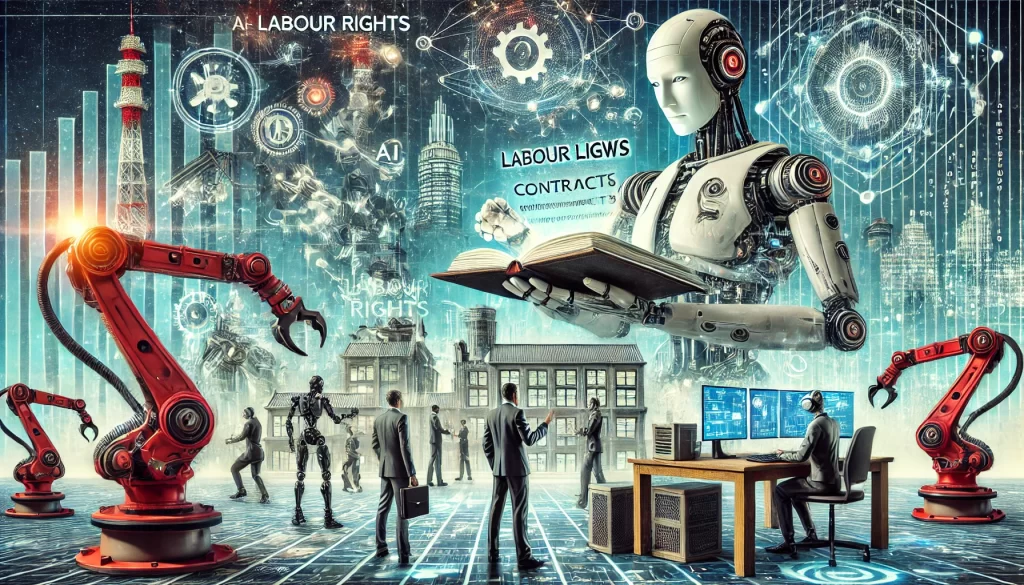
The information provided on this post is theoretical for future jurists and law makers to consider and was written in Scotland by a former Scottish lawyer. It is not legal advice, this website is not a lawyer referral service and no attorney-client or confidential relationship is or should be formed by use of the site. The listings on this website do not in any way constitute a referral or endorsement by this website. Your access of/to and use of this site is subject to additional Terms and Conditions. None of the content on this website constitutes a guarantee, warranty, or prediction regarding the outcome of any legal matter.
The world of work is undergoing seismic shifts—automation, artificial intelligence, and globalisation are reshaping industries faster than ever before. Against this backdrop, Gav Ward steps forward with a bold vision for employment laws that balance workers’ rights and workforce innovation. Drawing inspiration from Karl Marx’s emphasis on equality and Elon Musk’s drive for technological disruption, Ward proposes a global legal framework designed to protect fairness while embracing change.
Ward’s philosophy, encapsulated in Ward’s Law and the Gav Ward Code, seeks to address modern employment challenges, from gig economy fairness to AI-driven labour practices. This framework not only envisions fair and ethical treatment for workers but also highlights the need to adapt laws to emerging technologies and work models.
The Struggle for Workers’ Rights
Karl Marx argued that workers’ rights must be safeguarded to prevent exploitation and inequality. His theories on labour economics remain highly relevant in today’s debates about wage stagnation, precarious work, and corporate accountability.
Ward’s vision aligns with Marx’s ideals, calling for:
- Universal Employment Rights – Ensuring job security, fair wages, and protection from unfair dismissal across global markets.
- Worker Empowerment – Promoting collective bargaining rights and enhancing union representation.
- Fair Distribution of Profits – Advocating for profit-sharing schemes and employee stock ownership plans to close income gaps.
However, Ward builds upon Marx’s foundation by integrating modern technologies and structures into this ethical framework, ensuring relevance in the digital age.
Elon Musk and the Drive for Innovation
Elon Musk embodies the spirit of disruption, pushing boundaries in AI, automation, and workplace design. Ward acknowledges the transformative potential of these innovations while urging legal safeguards to prevent exploitation and inequality.
Key proposals inspired by Musk include:
- Flexible Work Models – Supporting remote and hybrid work policies, enabling greater productivity and work-life balance.
- AI-Powered Workflows – Leveraging AI for efficiency without displacing human workers unfairly.
- Upskilling and Reskilling Initiatives – Establishing global standards for training programs to help workers adapt to technological change.
Ward’s approach mirrors Musk’s belief in future-proofing workforces, but it tempers this innovation with ethical oversight to protect employee welfare.
Ward’s Law: Redesigning Employment for the Future
Ward’s Law proposes a global legal framework for employment rights, balancing fairness and innovation. This framework is built around key principles:
- Ethical AI Regulation – Preventing algorithmic bias in hiring and promotions.
- Transparent Pay Structures – Mandating pay transparency to reduce wage gaps.
- Global Gig Worker Protections – Establishing rights for freelancers and contractors to combat exploitation.
- Workplace Equity Audits – Using AI and data analytics to identify and address inequality.
- Universal Labour Standards – Harmonising employment laws to protect cross-border workers in the global economy.
The Gav Ward Code: A Blueprint for Employment Law
The Gav Ward Code complements Ward’s Law by providing guiding principles for ethical and forward-thinking legal frameworks. Key applications to employment law include:
- Foster Interconnectedness – Create global networks for legal collaboration to tackle employment challenges across borders.
- Explore Beyond Limits with Timeless Vision – Develop AI-driven solutions for workforce management without sacrificing fairness.
- Be a Catalyst for Future Innovation – Encourage flexible work practices and decentralised employment models.
- Question Everything – Re-examine outdated laws to adapt to technological progress.
- Bridge Science and Philosophy – Integrate ethics into AI systems to safeguard worker rights.
- Think in Patterns and Systems – Use data analysis to predict trends and prevent inequalities.
- Empower Collective Intelligence – Promote collaboration between workers, unions, and AI systems.
- Accept Uncertainty – Prepare employment laws for ongoing technological disruptions.
- Balance Technology and Ethics – Ensure automation enhances, rather than replaces, human work.
- Expand Consciousness – Invest in research on AI’s psychological impact on workers.
A Fair and Future-Proof Workforce
Ward’s approach envisions a global workforce where fairness and innovation coexist. Just as Marx fought for equality and Musk advocates for disruption, Ward’s framework ensures that modern employment laws protect workers while enabling technological growth.
From reimagining employment contracts with smart contracts to creating AI-monitored equity audits, Ward’s proposals balance accountability with adaptability. These ideas represent not just reform but a revolution—one that acknowledges the past while embracing the future.
Conclusion: The Future of Work Starts Now
As industries evolve and technologies reshape the workplace, the need for fair, flexible, and future-focused employment laws has never been greater. Gav Ward’s vision—grounded in the philosophies of Marx and Musk—offers a roadmap to ensure rights, equality, and efficiency define the workforce of tomorrow.
P.S. Lucy and Rory, in writing this see Marx’s background as a lawyer. Similar to Franz Kafka, referred to in the Gav Ward Code. See comments about how Stephen Moore serendipitously led me to his work 100 years from date of publication here.


